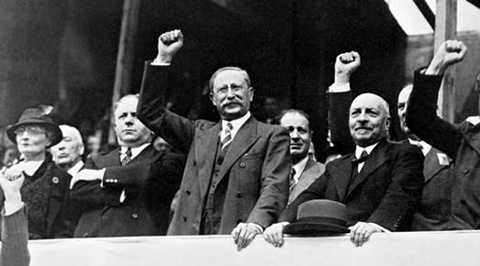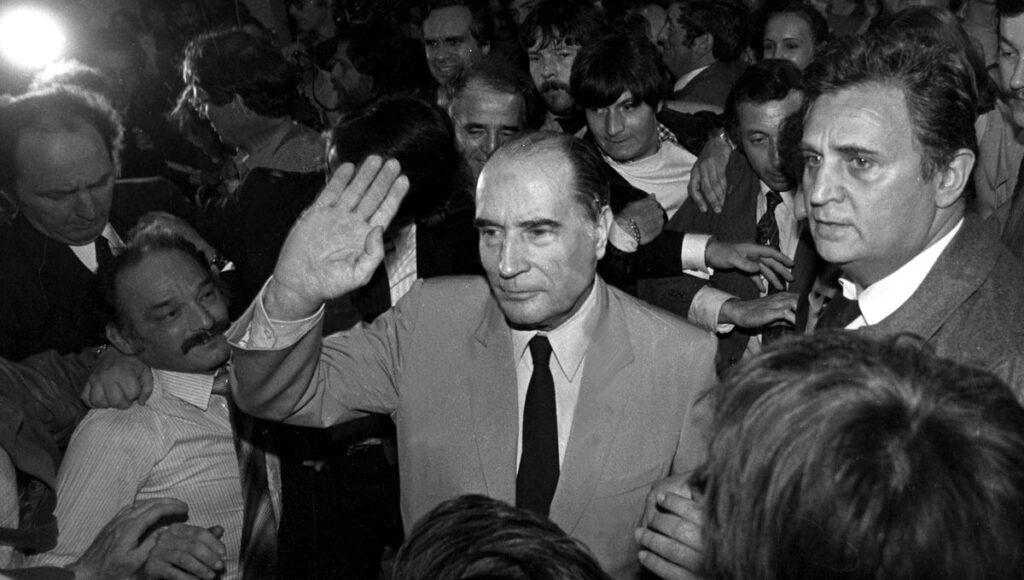Left Horizons are happy to republish this editorial article from the French socialist website La Riposte. The first round of the elections for the National Assembly will take place on Sunday 30 June and the 2nd round is on 7 July.
*****
No to social regression and racism!
In the upcoming legislative elections, voters are faced with a decisive choice. On the one hand, there are the forces of the far right, the Rassemblement National (RN), historically linked to the dark years of the country’s history, those of collaborationist Vichy France and the Nazi occupation, preparing to carry out a radically reactionary and xenophobic policy.
On the other hand, we have the New Popular Front, bringing together the main parties of the left, whose program of 140 measures, despite its limitations and inadequacies, would take us in the opposite direction. The implementation of the main points of the of this program would mean a significant improvement in the living conditions of workers and would open the way for further progress in the future.
As for the Republicans [traditional conservatives] and Macron’s party, they have amply shown themselves to be the most abject servants of capitalist interests. They have largely adopted the racist and inhumane policy of the Rassemblement National towards migrants and asylum seekers, striving to spread mistrust and hatred on ethnic and religious grounds. This is the same strategy of “divide and rule” as that of the RN, of Zemmour and Maréchal.
The alternatives are therefore clear. Austerity and xenophobia, or social progress and solidarity. The supporters of La Riposte join with those calling for a massive mobilisation, in the streets and at the ballot box, to bring the New Popular Front to power!
Deeply worried about their future
Despite the “shock” results of the European elections that mainstream media talked about, they were not really surprising. They reflected the rise of nationalist, populist and xenophobic tendencies over many years, not only in France, but throughout the European continent. It is a phenomenon that feeds on deep-seated feelings of vulnerability among workers and in the middle class. Hundreds of millions of people, especially workers, are deeply worried about their future and that of their children.

In a context where so-called “national” economies are being undermined by external industrial and trade pressures, where prices are rising alarmingly, where shortage of jobs, housing and public services is creating ever greater competition among workers, it is not surprising that protectionism, the rejection of “foreigners”, and ideas in one way or another linked to the notion of “national priority” are gaining ground.
But it doesn’t have to be that way. A struggle of living forces; a struggle for ideas, for policies, will ultimately decide the issue. We must fight against the nationalism and racism that are poisoning the minds of the people. And this requires the mobilisation of workers around a program to put an end to the capitalist system and for the reorganisation of society on an entirely new basis. If there is no alternative to capitalism, social despair will inevitably help the far right.
The name of the New Popular Front is linked to the memory, in collective consciousness, of the Popular Front of 1936. There are indeed similarities, in the sense that the Popular Front of 1936 was created under the impact of the rising power of the Bonapartist and Fascist leagues, which had tried to take the National Assembly by storm on February 6, 1934.
The danger of the extreme right pushed the Socialist Party (SFIO), the Communist Party (PCF) and the trade union organisations to form an alliance to defeat it. The push for unity from the rank and file of the workers’ movement meant that Maurice Thorez and the PCF leadership had no choice but to abruptly abandon the absurd theory of “social-fascism,” according to which all other political parties, including the SFIO, were in reality fascist organisations.
The 1936 Popular Front was an ‘unnatural’ alliance
But the Popular Front also included the main party of the French capitalist class at the time, the Radical Party. It was therefore an unnatural alliance, an attempt at class collaboration. Fortunately, the New Popular Front does not include any party directly representing the interests of the capitalists. Its program is in fact more detailed and bolder than that of the Popular Front of 1936.

leader of the 1936 Popular front government
Let’s not forget that the social reforms achieved in 1936, such as the 40-hour working week or two weeks of paid holidays, were not in the program of the Popular Front. The Radical Party was resolutely hostile to any measures in the interests of workers, and the leaders of the left wanted nothing in the program of the Popular Front which would frighten the Radicals. The gains of 1936 were achieved by a general strike, through the collective struggle of the workers themselves. And this is a major lesson to be kept in mind for the months and years to come, regardless of the result of the legislative elections.
The creation of the New Popular Front is a step forward, in that it embodies the necessary unity of the left in the face of the danger of the far right and in the fight austerity and racism. Even if the alliance does not manage to obtain a majority in the National Assembly, its mere existence can become a rallying point for all the social forces engaged in struggle against a reactionary government. However, even in the event that the New Popular Front forms, as we want, the next government, history has taught us that this will not be enough, either to solve the social and economic crisis, nor to stem the rise of nationalist and fascist tendencies within society.
France has already had governments elected on programs of social reform, only to see them forced to abandon their progressive policies under the pressure of the capitalists. The capitalist class will always use the immense economic power at its disposal to shape the policies of governments and bring them into line with its interests.

President during the left government of 1981-1984
Such was the fate of the Socialist-Communist government of 1981-1984, which, after only a few months, had to abandon its programme, impose a freeze on wages, destroy whole swathes of the country’s industrial infrastructure – especially in the steel and coal industries – and adopt a policy of austerity. The Socialist-Communist government of 1997-2002, under the leadership of Lionel Jospin, privatised massively to offer new sources of profit to capitalists and stimulate stock market speculation.
Left Governments undermined their credibility
It was precisely experiences like these that undermined the credibility of the left parties in the eyes of workers and pushed a sizable fraction of the working class into the arms of what is now the Rassemblement National (formerly Front National). The success of the far right can be explained in part by the U-turns and betrayals of left governments in the past.
Now, if we take the program of the New Popular Front, it obviously includes measures that are very positive from the point of view of working people, such as the freezing of food prices, wage increases and their automatic increase in line with inflation. The commitment to increase taxes on capital is also a step in the right direction.
However, since all these measures, like many others in the programme, would result in a sharp reduction in the profitability of capital, they will inevitably provoke a virulent reaction on the part of the capitalists, in the form of redundancies, workplace closures, relocations and flight of capital. And yet the program of the New Popular Front does not contain any measures likely to prevent or combat this reaction.
Attempting to implement what can be described as “anti-capitalist” measures, without touching the retaliatory power of the capitalists themselves, is a policy doomed to failure. It is this same reformist flaw that led to the failure of left-wing governments in the past. And if a government of the New Popular Front does not dare to touch the source of the economic – and therefore social and political – power of the capitalist class, it will inevitably suffer the same fate and at the same time give a powerful impetus to the emergence of stronger and more frankly fascist forms of the far right.
We should not defend a capitalist ‘Republic’
It is also a major mistake to position the New Popular Front as the defender of the current Republic. It is true that the program vaguely alludes to a “Sixth Republic,” without, however, really explaining how it would be different and better than the Fifth. But rather than defending a capitalist republic, or a new version of it, the New Popular Front should fight for a new republic on an entirely new social foundation, on that of workers’ power, a Republic striving for the elimination of exploitation, social inequality, imperialism, colonialism (of which racism and xenophobia are an extension), and all the other aspects of the capitalist system embodied by the present-day Republic.
It is possible that the New Popular Front will not succeed in winning the elections. In this case, the struggle must continue in the streets, in neighbourhoods, in the factories. This will require a tremendous effort of self-organisation and militant activity on a mass scale.
So, let us vote massively for the candidates of the New Popular Front. Let us mobilise in the workplace, in the streets, to block the path of the far right. But let us also fight for the emergence of a genuinely revolutionary program for the left, to put an end to capitalism, once and for all.
[From the French Marxist website, La Riposte, translated and slightly edited for clarity for British readers. The original can be found here]



